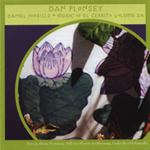|
|
 |
Dusted Reviews
Artist: Dan Plonsey Album: Portcullis Label: Un-Limited Sedition Review date: Jun. 20, 2004 |

|
|
|
 |
For years, Bay Area guitarist John Shiurba has been documenting some of his scene’s rich, quirky improvisational music on his frustratingly, but appropriately, named Limited Sedition imprint. Well, he’s finally taken the plunge into wider (and more permanent) documentation with Un-Limited Sedition, which will concentrate largely on compositional material. Reedist Dan Plonsey (credited here with C-melody sax, oboe, voice, and harmonica) makes an impressive contribution to these endeavors, and has assembled 18 musicians under the collective moniker Daniel Popsicle (including the late, lamented Matthew Sperry on bass, guitarists Johns Schott and Shiurba, and trumpeter Tom Djll). Plonsey is a prolific composer, specializing in large ensemble music, and as a conceptualist he is determined to have his music communicate. He doesn’t necessarily seek to do this by loading his music down with conventional idiomatic gestures, but by imparting to it a kind of narrative flow.
This particular release is subtitled “Music of El Cerrito, Volume 2A: Moving About, Humming, Still Our Flowers Are Blooming, Under the Old Portcullis.” Rather than using written music as a structure around which to hang a bunch of expressive statements by these players (all of whom are quite capable of compelling work in that area), Plonsey makes sure that the expression consists of the rendering of the form itself. It’s music concerned with the pulsating life of the animal and plant worlds in El Cerrito, but also about the ways in which human moral and political constructs can be conceptually related to this kind of biological activity. Not that you necessarily need to appreciate this to dig Plonsey’s music, but it casts this already rich work in a new light.
If I were to sum up the music in a brief phrase, I would say that it’s methodologically akin to an hour-long Anthony Braxton Ghost Trance Music composition, but with an entirely different harmonic and melodic content. That is, the music rolls forward at a basically constant tempo containing endless subtle variations within and around the pulse. But the melody and harmony, while operating in a loosely repeating and uncannily familiar field, are continually evolving.
The music is thus both simple and complex; it’s certainly quite experimental, if that matters to you, but it also possesses a very emotional and communicative directness. You can hear the players’ personalities – for example, a cranky trombone, Shiurba’s rattling prepared guitar, or the eldritch arco from string players – but what’s important overall is the feel, the density, the color of the music. It cycles through abstracted, refracted idioms, from Copland to Sousa to Roscoe to Ives. It changes shape and color, from sunny green hillsides to thunderstorm dark and deep earth brown; and it invites you in, even as it remains elusive. The hour goes by so quickly, and this piece really draws you in, revealing multiple new dimensions upon each listen. Portcullis is a real accomplishment.
By Jason Bivins
|







